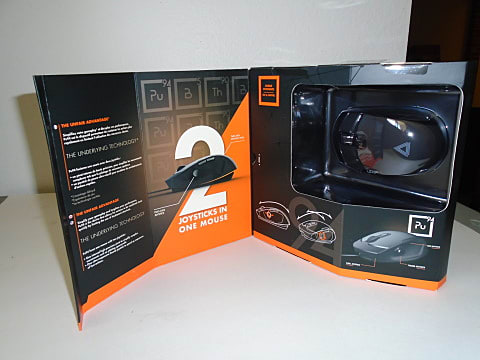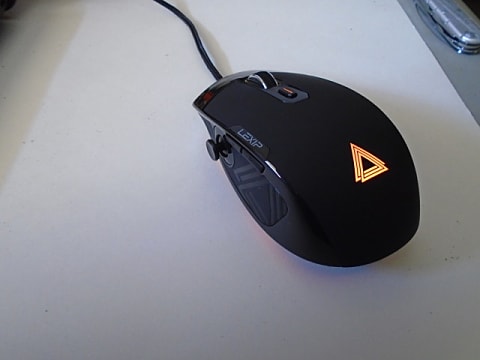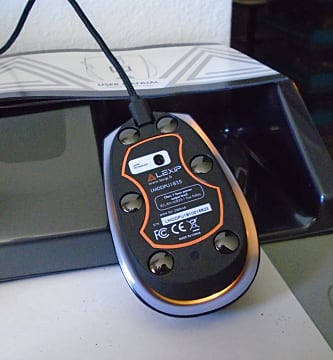

Lexip is a French company, which mounted a successful Kickstarter early last year to deliver a specialized gaming mouse to the world. The trademark feature of the Pu94 is that it integrates two separate internal, miniaturized analog joysticks. One's on the left side of the mouse, under your thumb; the other is controlled by subtly rocking the mouse's shell on its spring-loaded base.

To be honest, when I first heard of it, I wasn't sure why Lexip thought I'd want it. Having a couple of extra makeshift joysticks on a gaming mouse sounded like a level of innovation for innovation's sake, something that you don't often see outside late-night commercials. They might as well have stuck a garlic press on there, or a mandolin slicer, for all the practical application it seemed to have.
The goal, according to Lexip, is to buy yourself a couple of extra seconds in-game by allowing you to move and click simultaneously with the same hand. You can reassign your "WASD" keys to one of the integrated joysticks, for example, so you can pivot, aim, move, and strafe entirely with your mouse.
Lexip's initial product launch last year was bogged down a bit by glitchy software. The company showed up at E3 this year ready to roll with some updates, aiming to make up for lost time, and offered me a chance to test-drive a new edition of the Pu94.
After a couple of weeks of play, it does have a lot going for it.
I'm rough on hardware, and the Pu94 is one of the more sturdy-feeling gaming mice I've ever used. It's got a nice long braided cord, ceramic "feet" along its bottom for a surprisingly smooth glide, two extra buttons on its left side, and one extra "Lexip" button on top underneath the scroll wheel. It's also comfortable in my hand.

I do have to ding the Pu94 straight out of the gate, however, for a lack of documentation. The manual and box appear to be written on the assumption that you're probably buying the mouse straight from Lexip itself, so you've obviously already done your research. Nothing that comes with the mouse tells you about its control panel, which is a free download from Lexip's website, and which is required before you can take advantage of the Pu94's additional options.
Without the control panel, it's just an expensive plug-and-play mouse, with a strange rocking base and a thumbstick that's little better than a second, pointier, oversensitive scroll wheel.
Once you install the control panel, which is still a little glitchy (one of the menus consistently stayed open on my screen even after I closed the panel) but entirely usable, you can start tinkering with the Pu94's DPI, change the colors of its lights, customize the buttons, and adjust the sticks' sensitivity. It comes with a number of pre-set options for games like Kerbal Space Program, DOTA 2, World of Warcraft, and Counter-Strike.
The general idea is meant to be that once you're used to it, you can use the mouse to do some or all of your in-game motion, instead of the mouse plus a keyboard, which means you gain valuable seconds in the heat of the fray.
It does require a lot of custom tinkering unless you're playing one of the games that are already included as presets, however, and once you've got it working, there's a fairly hellacious learning curve. It takes a lot of time to decouple yourself from the old "WASD"/mouse combination, although it's surprisingly useful to be able to save your left hand for things like context commands and quick-selecting weapons.
Mostly, though, this is a gimmick. The Kickstarter and website for the Pu94 are both littered with testimonials from satisfied players who've used the mouse to gain a new competitive edge, but for the amount of work you're putting in here, you have to take your fun fairly seriously. I don't see the real utility here unless you're actually looking to go pro.
There are two big exceptions, though. One is obvious: this would be an ideal solution for any player who happens to not have full use of both hands. The Pu94's actually a surprisingly great accessibility option.
The other is that the dual joysticks make the Pu94 a nice option for playing certain kinds of games that are heavy on spatial navigation. Some players have reported that it's excellent for flight simulators, for example, or building games like The Sims. I actually found it a decent option for playing the non-VR edition of the recent release Bow to Blood, a sort of naval-action game, as it let me move through space a bit more elegantly than a simple "WASD"/mouse combination would allow.
Pros:
- A comfortable, sleek ergonomic gaming mouse that's built to last
- Adjustable all the way up to 12,000 DPI
- Incredibly useful for certain genres, such as flight simulators
- A great potential accessibility option for disabled or recovering players
Cons:
- The packaging and manual in the box do not actually mention the control panel software at all; I guess you're supposed to go to the Lexip website out of sheer curiosity and find it that way
- Definitely a hardcore option for serious players, as only the most driven or dedicated fans will sit down and spend a couple of hours customizing a control scheme like this one
- A niche product; if you don't intend to use it for its specific hardware options, you'd do better to get a Logitech or Razer product for a bit less money
The Pu94 isn't a bad mouse on its own, and I'd be interested in buying a stripped-down model that simply featured the same degree of comfort and sensitivity. The big key features here, however, take enough work to set up that I question the value of the product as a whole. It's not bad, but outside of a few edge cases or particular genres, it's not particularly necessary.
If you like tinkering with weird hardware, though, this is a must-have. One way or another, there isn't much else like this on the market today.
[Note: A Pu94 review unit was provided by Lexip for the purpose of this review.]
0 comments:
Post a Comment